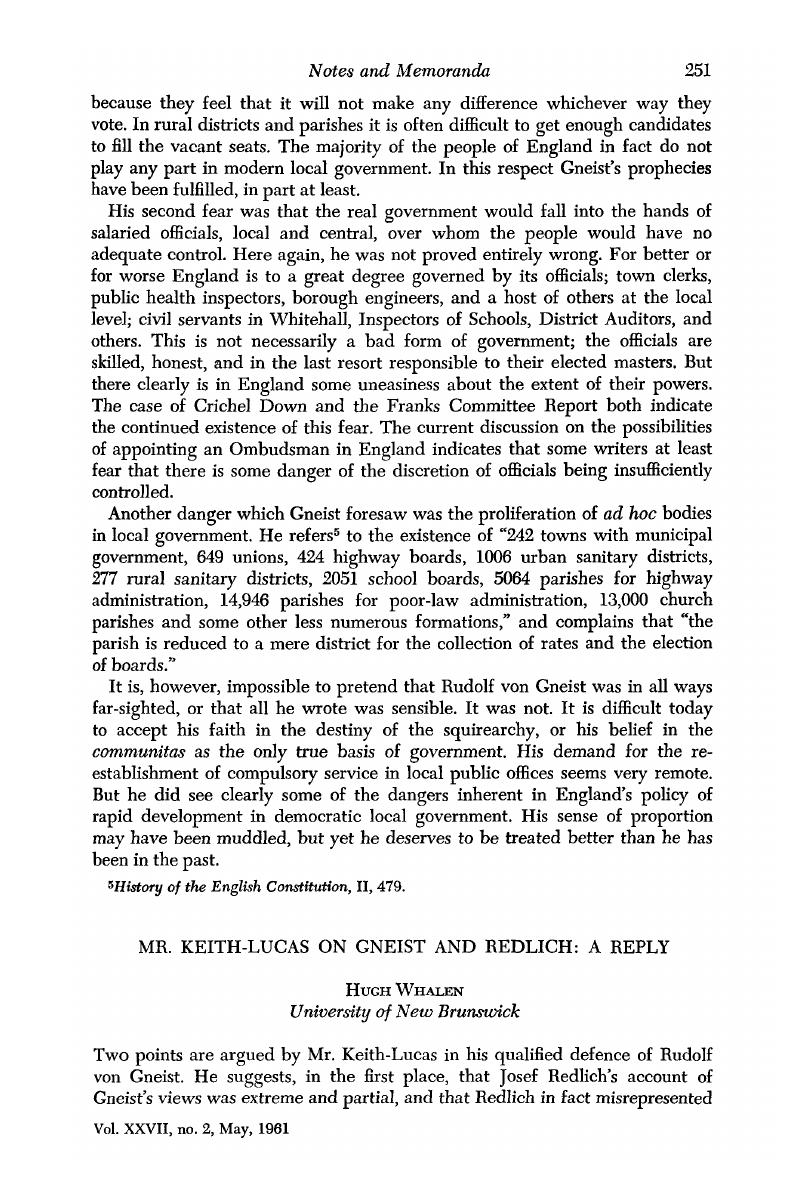No CrossRef data available.
Article contents
Mr. Keith-Lucas on Gneist and Redlich: A Reply
Published online by Cambridge University Press: 07 November 2014
Abstract

- Type
- Notes and Memoranda
- Information
- Canadian Journal of Economics and Political Science/Revue canadienne de economiques et science politique , Volume 27 , Issue 2 , May 1961 , pp. 251 - 256
- Copyright
- Copyright © Canadian Political Science Association 1961
References
1 This point is an elaboration of the position taken by Mr.Keith-Lucas, in his introduction to The History of Local Government in England (London, 1958)Google Scholar, being a reissue of Local Government in England (Book I), by Redlich, and Hirst, . (London, 1903.)Google Scholar The author therein asserts that Redlich's views were uncompromising, that his assault was too vigorous for English taste, and that, in any case, “the English public was not interested in the academic conflicts of these German professors.” “One s sympathies,” writes Mr. Keith-Lucas (p. xiii), “may lie more with Redlich than with Gneist, but yet one may wonder whether there was not some virtue in the participation which Gneist admired but Redlich scorned.”
2 In his Defence Mr. Keith-Lucas suggests that my critique of Gneist, in “Ideology, Democracy, and the Foundations of Local Self-Government” in this Journal, 08, 1960 Google Scholar, proceeds at least in part from Redlich's defective interpretation. In fact the critique was developed independently of Redlich's evaluation of Gneist's doctrine; I agree with much, but not all, of the Austrian's interpretation. The decision to use quotations from Redlich and Hirst's Local Government in England rather than from Ashworth's, translation of the monumental Englische Verfassungsgeschichte (The History of the English Constitution (1st ed., London, 1886))Google Scholar was reached for the following reason. Although the latter work certainly provides a more complete view of Gneist as political philosopher and historian, it cannot be considered a superior source for information on his doctrine of local self-government. For students of local government who are unable to consult Gneist's voluminous and repetitive works in the German, the book by Redlich and Hirst is indeed a better source; it contains, for one thing, extensive quotations from the writings of Gneist which predate his History (1882): e.g., the successive editions of Die Englische Communal-Verfassung oder das System des Self-Government (1860), Englische Verwaltungsrecht (1867), and Verwaltung, Justiz, Rechtsweg (1869), none of which has been, or is likely to be, translated into English.
3 Redlich, and Hirst, , Local Government in England, II, 381.Google Scholar
4 Ibid., 381.
5 Gneist, , History, II, 423.Google Scholar
6 See ibid., 107, for an explicit statement of the non-democratic basis of magisterial self-government.
7 Ibid., 358.
8 Ibid., 448–9.
9 Ibid., 317.
10 Smellie, K. B., A History of Local Government (London, 1957), 12.Google Scholar
11 Gneist was greatly influenced by the hard tradition of Prussian idealism, and was himself one of the lights of the Historic Rights School, having studied under von Savigny. Explicit acknowledgement of this influence is made in the preface to Verfassungsgeschichte.
12 Cassirer, E., The Myth of the State (New York, 1955), 228.Google Scholar
13 Hippel, E. Von, “Rudolf Gneist,” Encyclopedia of the Social Sciences, vol. 6, 682.Google Scholar




